कभी भी यह जानने की कोशिश न करें कि एक अरब परिवार में दो लोग एक-दूसरे से कैसे संबंधित हैं, जब तक कि आप एक लंबा और विस्तृत वंशावली पाठ सुनने के लिए तैयार न हों, जो किसी तरह कई पीढ़ियों और कम से कम तीन चचेरे भाइयों तक फैला होता है। एक साधारण "चाचा" या "चचेरा भाई" कभी पर्याप्त नहीं होता – हर उत्तर के साथ एक संक्षिप्त पारिवारिक इतिहास जुड़ा होता है, और जब तक वे समाप्त करते हैं, तब तक आप शायद भूल चुके होंगे कि आपने यह सवाल क्यों पूछा था। 😅
अरबी संस्कृति में, परिवार केवल निकट संबंधियों तक सीमित नहीं है; यह एक विस्तृत, आपस में जुड़ा हुआ नेटवर्क है जहाँ हर कोई एक-दूसरे को जानता हुआ प्रतीत होता है – या कम से कम ऐसा दिखाता है। 🙂 पारिवारिक संबंध केवल जैविक नहीं होते; वे एक सामाजिक संरचना का निर्माण करते हैं जो रिश्तों और बातचीत को प्रभावित करती है। यह मायने रखता है कि कोई व्यक्ति मातृ पक्ष से संबंधित है या पितृ पक्ष से, वह बड़ा है या छोटा, और यह उन विशिष्ट शब्दों में परिलक्षित होता है जिनका उपयोग उनके लिए किया जाता है। उदाहरण के लिए, "चाचा" और "मौसा" जैसे शब्द कई अन्य भाषाओं की तुलना में कहीं अधिक विशिष्ट होते हैं।
यदि आप अरबी में माँ और अरबी में पिता सीखना चाहते हैं, तो सबसे अच्छा है कि बुनियादी बातों से शुरू करें। अरबी में माँ أم (Umm) है, जबकि अरबी में पिता أب (Ab) है। यहां से, एक पूरा तंत्र खुलता है, जहां हर रिश्तेदार को परिवार में उनकी सटीक स्थिति के आधार पर एक विशिष्ट नाम दिया जाता है। यदि आप जानना चाहते हैं कि अरब लोग अपने परिवार के सदस्यों को कैसे संबोधित करते हैं – और गलती से किसी अजनबी को "चाचा" कहने से बचना चाहते हैं – तो पढ़ते रहें! 😃
If you want to deepen your knowledge of Arabic, try the PixiLearn Arabic learning app, where you can learn Arabic words and phrases in a fun and interactive way. Download it now and start learning! Learn Arabic words with PixiLearn
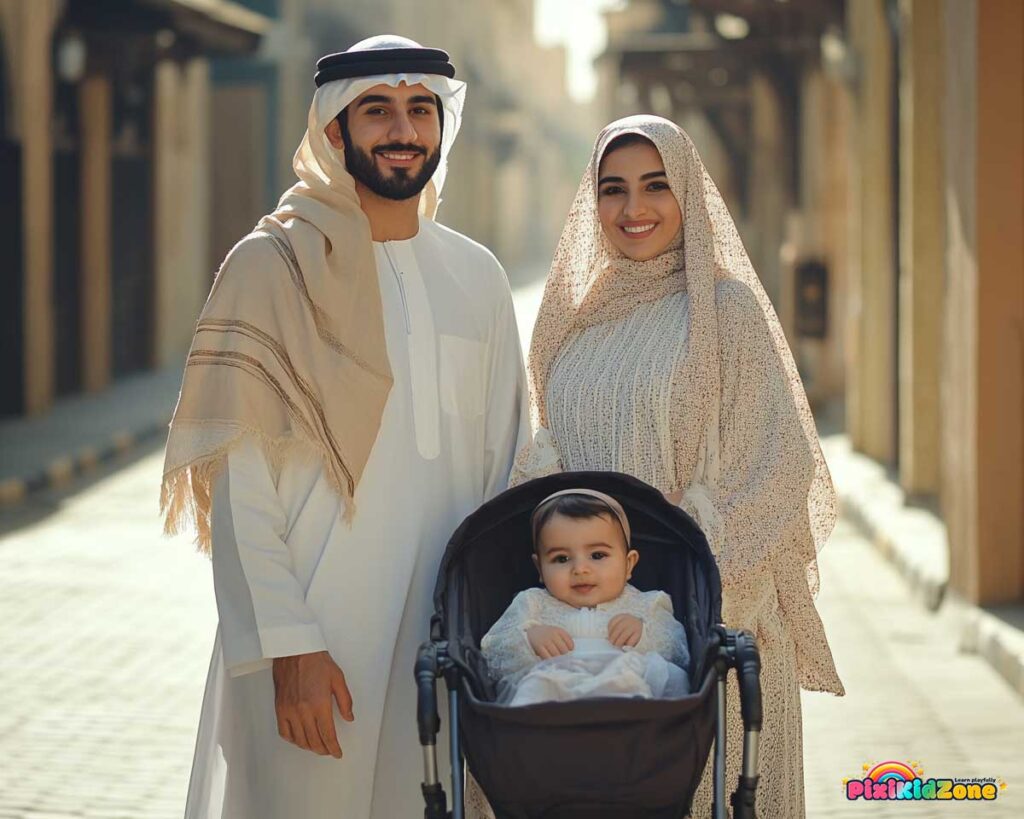
अरबी में माँ और पिता
अरबी में माँ – أم (Umm)
अरबी में माँ के लिए शब्द أم (Umm) है, जिसका उच्चारण “Omm” होता है।
अरबी संस्कृति में, माताएँ एक केंद्रीय भूमिका निभाती हैं और अक्सर परिवार का दिल मानी जाती हैं। अरबी भाषा इस गहरे सम्मान को प्रेमपूर्ण उपाधियों के माध्यम से दर्शाती है, जैसे “Umm + सबसे बड़े बच्चे का नाम”, जहाँ माँ को कभी-कभी उनके पहले बच्चे के नाम से बुलाया जाता है, जैसे Umm Ahmed (अहमद की माँ)।
अरबी में पिता – أب (Ab)
अरबी में पिता के लिए शब्द أب (Ab) है, जिसका उच्चारण “Ab” होता है।
अरबी संस्कृति में, पिता को पारंपरिक रूप से घर का मुखिया माना जाता है, जो मार्गदर्शन और समर्थन के लिए ज़िम्मेदार होते हैं। माताओं की तरह, पिता भी सम्मानजनक उपाधियाँ प्राप्त करते हैं, आमतौर पर “Abu + सबसे बड़े बच्चे का नाम”, जैसे Abu Khalid (खालिद के पिता), जो परिवार में उनकी भूमिका और प्रतिष्ठा को दर्शाता है।
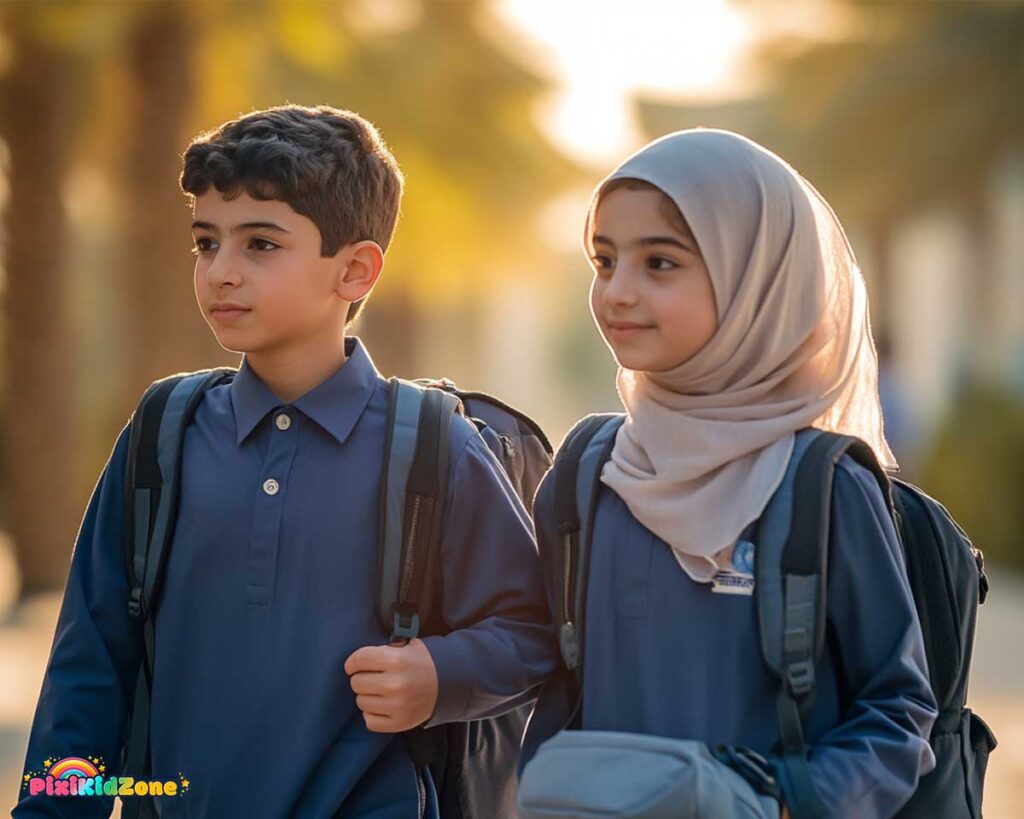
अरबी में बेटा और बेटी
अरबी में बेटा – ابن (Ibn)
अरबी में बेटा के लिए शब्द ابن (Ibn) है, जिसे कुछ बोलियों में “Ibn” या “Bin” उच्चारित किया जाता है।
Ibn शब्द न केवल रोज़मर्रा की पारिवारिक बातचीत में प्रयोग किया जाता है, बल्कि यह ऐतिहासिक और औपचारिक संदर्भों में भी दिखाई देता है, जैसे कि नामों में (Ibn Sina, जिसका अर्थ है सीना का पुत्र)। पारंपरिक अरबी समाज में, बेटों को अक्सर परिवार के नाम और विरासत के वाहक के रूप में देखा जाता है।
अरबी में बेटी – بنت (Bint)
अरबी में बेटी के लिए शब्द بنت (Bint) है, जिसका उच्चारण “Bint” होता है।
Ibn के विपरीत, जिसे अक्सर पूरे नामों में उपयोग किया जाता है, Bint वंश से संबंधित संदर्भों में दिखाई देता है, जैसे कि “Bint Ali”, जिसका अर्थ है अली की बेटी। ऐतिहासिक रूप से, इस शब्द का उपयोग कुलीन परिवारों में वंशावली को उजागर करने के लिए किया जाता था। कई अरबी परिवारों में, बेटियों को विशेष स्थान दिया जाता है और उन्हें प्यार भरे उपनाम मिलते हैं।
Arabic Word for Brother and Sister
Brother in Arabic – أخ (Akh)
In Arabic, the word for brother is أخ (Akh), pronounced as “Akh” (with a soft “kh” sound, like the German “Bach”).
In Arab culture, the bond between siblings is highly valued. An older brother (Akh Kabeer – أخ كبير) often takes on a protective and guiding role within the family, while younger brothers (Akh Sagheer – أخ صغير) are expected to show respect and follow their elders’ advice.
Sister in Arabic – أخت (Ukht)
The Arabic word for sister is أخت (Ukht), pronounced as “Ukht”.
Sisters hold a special place in Arab families, often taking on nurturing roles. An older sister (Ukht Kabeera – أخت كبيرة) is traditionally viewed as a second mother, offering guidance and care, while younger sisters (Ukht Sagheera – أخت صغيرة) are usually pampered and protected by their siblings.
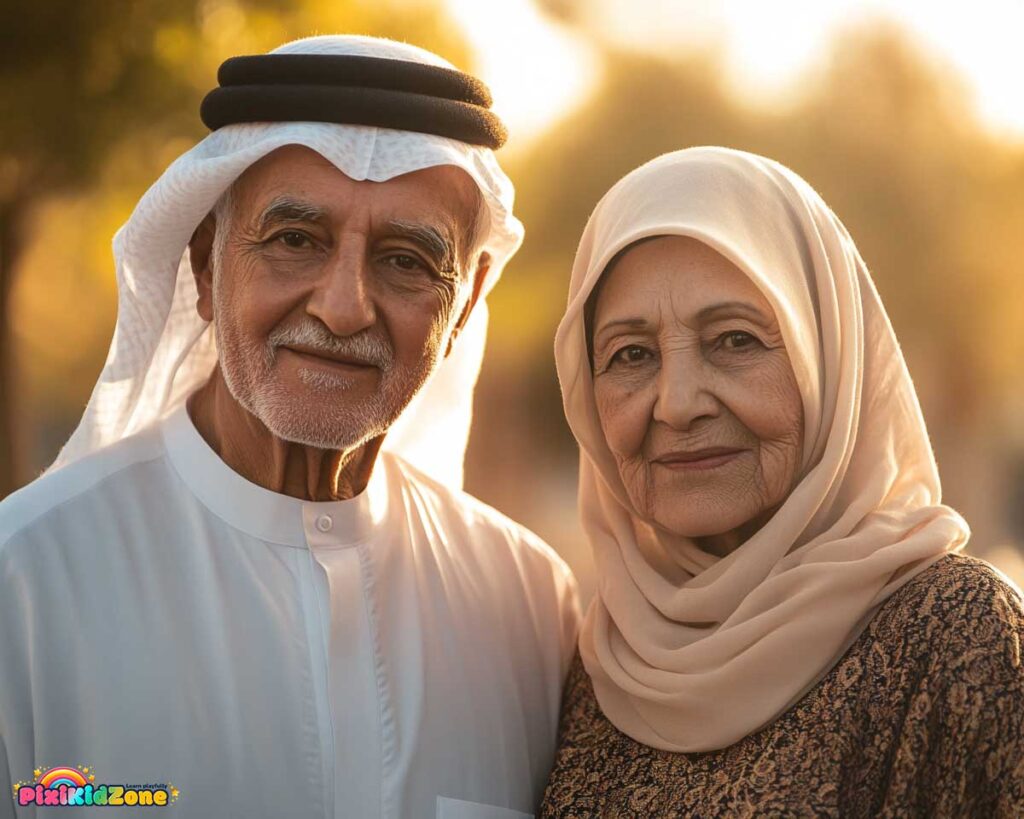
Arabic Word for Grandfather and Grandmother
Grandfather in Arabic – جد (Jadd)
In Arabic, the word for grandfather is جد (Jadd), pronounced as “Jadd”.
Grandfathers are highly respected in Arab families, often seen as the family’s wisdom keepers. They play an important role in passing down traditions, stories, and values. In some regions, affectionate terms like “Jiddi” (جدي) or “Sidi” (سيدي) are used to address grandfathers, reflecting deep respect and closeness.
Grandmother in Arabic – جدة (Jadda)
The Arabic word for grandmother is جدة (Jadda), pronounced as “Jadda”.
Grandmothers are often the heart of the household, known for their hospitality and love, especially when it comes to cooking! In some dialects, grandmothers are lovingly called “Teta” (تيتا) or “Jiddati” (جدتي). Their role extends beyond the family, as they often serve as the unifying force keeping multiple generations connected.
Arabic Word for Uncle and Aunt
Uncle in Arabic – عم (Am) / خال (Khal)
In Arabic, there are two different words for uncle, depending on whether he is from the father’s or mother’s side:
- عم (Am) – Paternal uncle (father’s brother), pronounced as “Am”
- خال (Khal) – Maternal uncle (mother’s brother), pronounced as “Khal”
Uncles often play a significant role in Arab families, acting as second fathers. The عم (Am), being from the father’s side, is often seen as an authoritative figure, while the خال (Khal) is traditionally known for being more affectionate and easygoing.
Aunt in Arabic – عمة (Amma) / خالة (Khala)
Just like with uncles, Arabic distinguishes between aunts from the paternal and maternal sides:
- عمة (Amma) – Paternal aunt (father’s sister), pronounced as “Amma”
- خالة (Khala) – Maternal aunt (mother’s sister), pronounced as “Khala”
Aunts, especially maternal ones (Khala), often take on a nurturing and caring role in a child’s life. The “Khala” is sometimes considered a second mother, while the “Amma” can hold a more traditional role within the extended family structure.
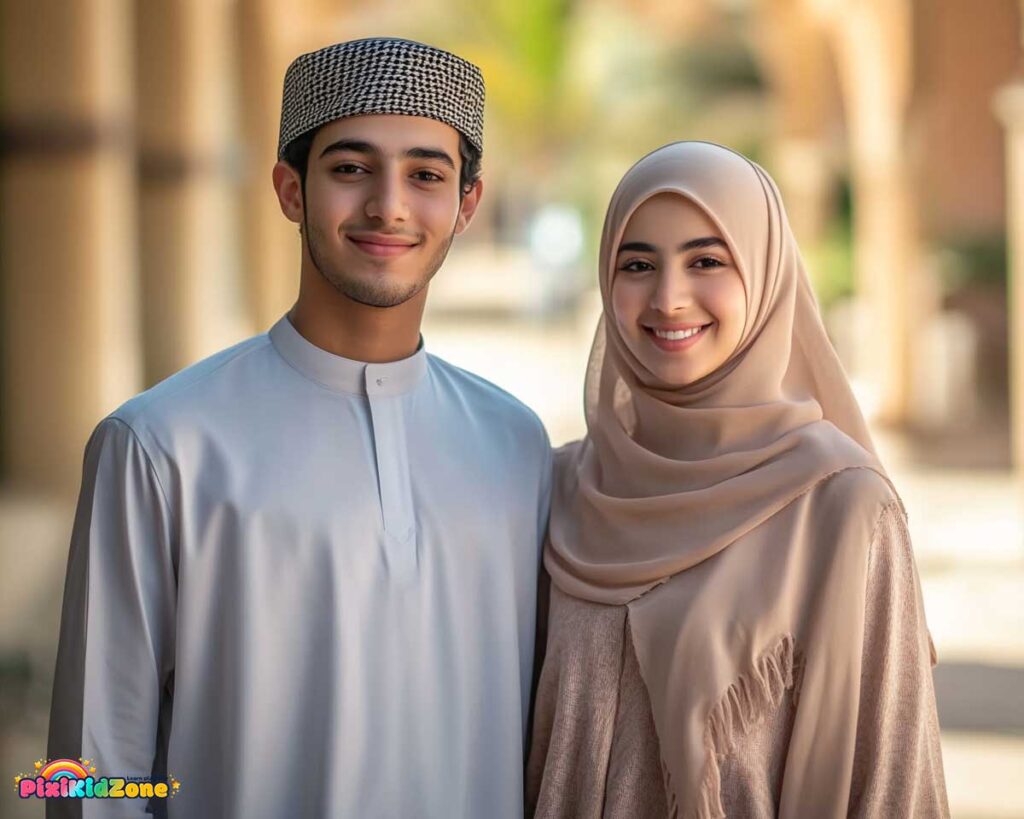
Arabic Word for Cousin (Male and Female)
Male Cousin in Arabic – ابن عم (Ibn Am) / ابن خال (Ibn Khal)
In Arabic, the word for male cousin depends on whether he is from the father’s or mother’s side:
- ابن عم (Ibn Am) – Paternal cousin (father’s brother’s son), pronounced as “Ibn Am”
- ابن خال (Ibn Khal) – Maternal cousin (mother’s brother’s son), pronounced as “Ibn Khal”
Cousins in Arab families are often as close as siblings, and in some cases, they even grow up together. Historically, in many Arab cultures, paternal cousins (especially Ibn Am) were considered potential marriage partners due to strong family ties and traditions.
Female Cousin in Arabic – بنت عم (Bint Am) / بنت خال (Bint Khal)
Similarly, the word for female cousin also changes depending on which side of the family she is from:
- بنت عم (Bint Am) – Paternal cousin (father’s brother’s daughter), pronounced as “Bint Am”
- بنت خال (Bint Khal) – Maternal cousin (mother’s brother’s daughter), pronounced as “Bint Khal”
Female cousins share a special bond in Arab families, often being treated as sisters. Just like with male cousins, Bint Am was traditionally seen as a close family connection, sometimes even a future spouse in arranged marriage traditions. However, in modern Arab society, cousin relationships are more about family unity and lifelong friendships.
Arabic Word for Grandson and Granddaughter
Grandson in Arabic – حفيد (Hafeed)
In Arabic, the word for grandson is حفيد (Hafeed), pronounced as “Hafeed”.
Grandsons hold a special place in Arab families, often being cherished and spoiled by their grandparents. In many cases, grandparents play an active role in raising and mentoring their grandsons, passing down traditions, stories, and wisdom.
Granddaughter in Arabic – حفيدة (Hafeeda)
The Arabic word for granddaughter is حفيدة (Hafeeda), pronounced as “Hafeeda”.
Granddaughters are equally adored, often receiving special attention from their grandmothers, who teach them family traditions, cooking secrets, and cultural values. In some Arab families, the first granddaughter even takes on a special role as the “little queen” of the household, bringing joy to everyone.
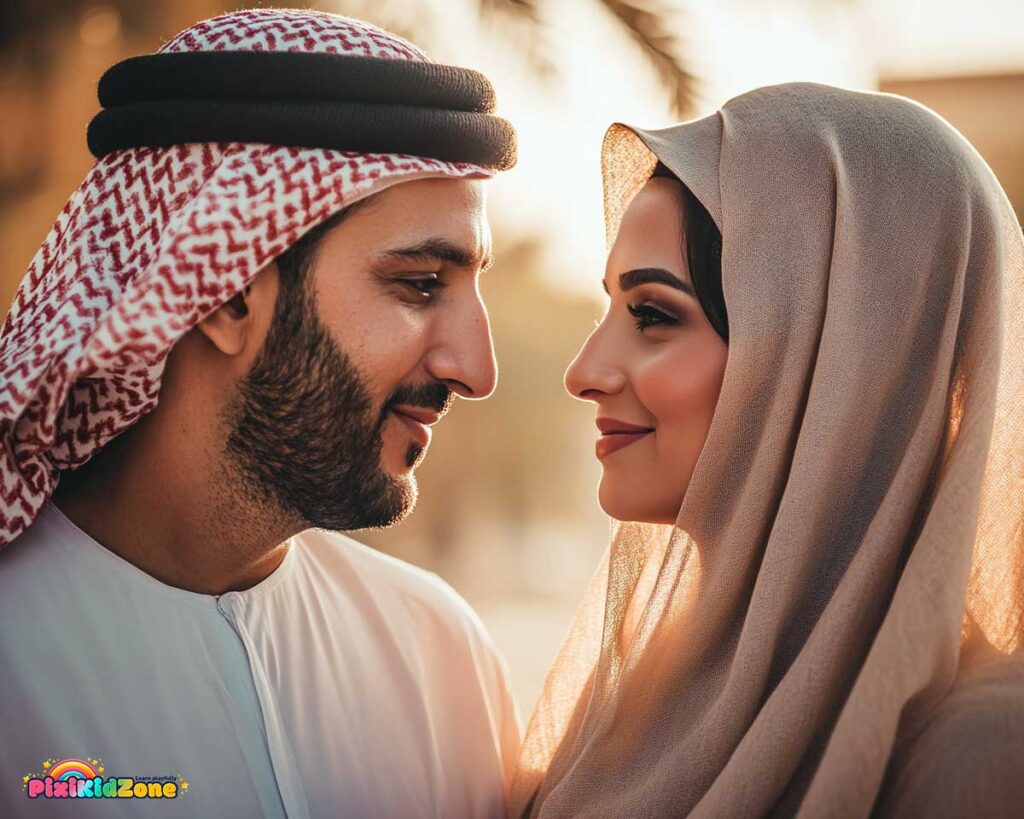
Arabic Word for Husband and Wife
Husband in Arabic – زوج (Zawj)
In Arabic, the word for husband is زوج (Zawj), pronounced as “Zawj”.
Marriage is highly valued in Arab culture, and the role of a husband extends beyond being a life partner—he is traditionally seen as the provider and protector of the family. The word “Zawj” can also mean “pair” in Arabic, emphasizing the idea of partnership and unity in marriage.
Wife in Arabic – زوجة (Zawja)
The Arabic word for wife is زوجة (Zawja), pronounced as “Zawja”.
Wives in Arab families hold an essential role, often seen as the heart of the home. In many traditional settings, the wife is responsible for maintaining family bonds, raising children, and preserving cultural traditions. The word “Zawja” comes from the same root as “Zawj”, reinforcing the idea that husband and wife are two halves of a whole.
Now You Know How to Address Someone in Arabic!
Learning Arabic family terms is not just useful for language learning—it’s a real cultural gateway. In Arab families, kinship ties mean much more than just blood relations—they shape social interactions, forms of respect, and even daily greetings.
If you ever visit an Arab family, you won’t be surprised to find that uncles and aunts have different specific titles, or that “Abu” and “Umm” (Father and Mother) are often followed by the name of their firstborn child. And if you ever ask, “How are these two related?”, you’ll quickly realize that it’s best to sit down and grab a notebook.
Now that you know the most important Arabic family words, maybe it’s time to try using them in a conversation. Who knows? The next time an Arab grandmother smiles at you, you might just know exactly how to address her. 😉
क्या आपने इन्हें पढ़ा है?
क्या आप मिस्री अरबी के बारे में अधिक जानना चाहते हैं? जानिए कि वास्तव में मिस्रवासी कौन सी भाषा बोलते हैं! https://pixikidzone.com/hi/blog/speak-the-egyptian-language-but-wait-what-language-do-they-actually-speak/
क्या आप जानना चाहते हैं कि अरबी में "आप कैसे हैं?" कैसे पूछा जाए? सबसे विनम्र तरीकों को सीखें! https://pixikidzone.com/hi/blog/arabic-for-how-are-you-learn-how-to-ask-politely/
क्या आपने कभी सोचा है कि अरबी में गालियाँ कैसी होती हैं? मोरक्कन से लेकर गल्फ़ डायलेक्ट तक, उच्चारण के साथ जानिए! https://pixikidzone.com/hi/blog/swear-words-in-arabic-from-moroccan-to-gulf-with-pronunciation/

 हिंदी
हिंदी



 English
English 简体中文
简体中文 Español
Español Deutsch
Deutsch Português
Português Magyar
Magyar Русский
Русский Français
Français العربية
العربية











